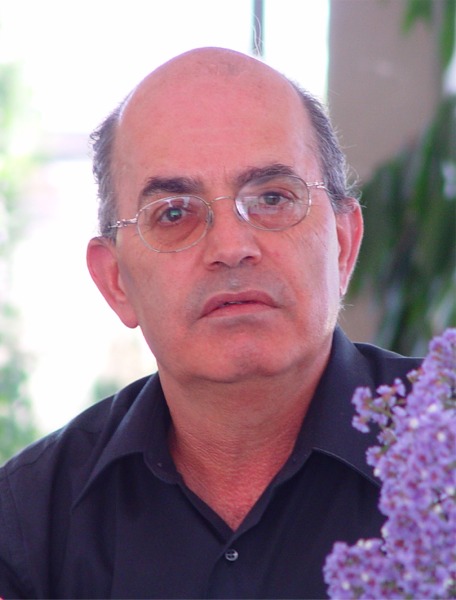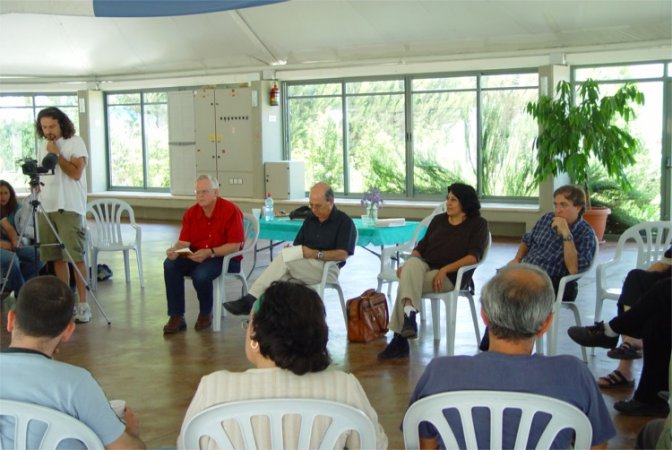Home > Oasis of Peace > Projects & Outreach > Doumia-Sakinah: The Pluralistic Spiritual Centre > The role of historical truth in the Palestinian-Israeli conflict
The role of historical truth in the Palestinian-Israeli conflict
Friday 6 May 2005
All the versions of this article: [عربي] [English] [עברית]

The second meeting of our series "Truth and Reconciliation" brought together two historians - a Jewish Israeli and a Palestinian of Israeli citizenship - who presented the dominant historical narratives of their separate sides. The speakers were also asked to relate to the possibility of a future reconciliation between the differing narratives.
As with the other activities of the series, the meeting was arranged together with the Bereaved Families Forum.
The first speaker was Dr. Yair Boimel, who heads the history department in the Oranim College of Higher Education.
Dr. Boimel described his relationship with the land and its landscapes as related to Jewish collective memory and heritage from the time of the Bible. Despite his strong feeling of rootedness in this land, he says that, for the sake of reconciliation, he is willing to accept that another people feels a similar identity with the same piece of land.
With this introduction, the speaker went on to describe the history of the Zionist movement from its beginnings in Europe during the 19th century until the war of 1948.
From the presentation of these events we can understand the motivations behind the way the Zionist leadership proceeded and acted as it did. For instance, that the leadership planned to establish a political entity with a Jewish majority, rather than a binational state, was already made clear when, during Turkish rule, they purchased land in areas that were later conquered in 1948, rather than lands in the West Bank . The areas from which Palestinians were evacuated and villages destroyed during the 1948 war also indicates this intention, and the outcome of the war was a ceasefire line behind which there was an 85% Jewish majority whereas before the war only 30% of the population in Palestine were Jews. A similar look at history can explain the causes of the Palestinian leadership’s failure in the struggle.
Towards the end of his presentation, Dr. Boimel related to the discrimination and oppression felt by the Palestinian minority in the nation. He asked himself whether he is willing to live with a situation of continuing discrimination against one population by the other. His conclusion was that it is possible to eliminate all forms of discrimination against the Arab citizens in Israel, and to arrive at a situation of full equality in every way except one: He would not be willing to forgo the continuance of a Jewish majority, nor to give up the Jewish character of the state. He said that for the sake of these things, he is willing to live with this modicum of discrimination and inequality . He drew a comparison between this and the rest of the world, which is similarly organized according to nations based on particular nationalities ("even if this proves to be a fiction"). He said he is unwilling "to surrender the Jewish character of the nation on the altar of reconciliation". In his opinion, a democratic nation from the Jordan River to the Sea would quickly turn into a Palestinian state and thus create a reality of discrimination against the Jews, for whom no country would remain.
The second speaker was Dr. Adel Manaa. Dr. Manaa directs The Center for the Study of Israeli Arab Society at the Van Leer Institute
Dr. Manaa remarked in his words that every narrative takes a base the culture viewpoint and values of the narrator. It is not appropriate for us to pass judgment on the past, for, if look closely at prevailing trends, we will reach the conclusion that the decision-makers could not have decided differently.
Dr. Manaa explained historical realities from an Arab and Muslim perspective, surveying the period from the beginning of the Arab conquest in the seventh century to the events of the twentieth century.
Looking at the modern period, Dr. Manaa brought our attention to the influence of the colonizing nations upon the Zionist movement and to similar attitudes towards "the natives" in Palestine. This cultural disparagement gave birth to myths like, "a land without a people for a people without a land".
Looking towards the future, Dr. Manaa said that any solution to the conflict would have to take the past into account. He suggested that if we wish to deepen our understanding of the narrative of the other side, we needed to "put ourselves in their shoes". It is appropriate to look towards the future, and to try to prevent a continuation of present suffering, but a true understanding of what is needed will only come from a study of the past.
Dr. Manaa says that it is not the job of a historian to determine who is right and who is wrong. On the other hand, he said, it is difficult to construe someone defending his home as being on the "bad" side of a conflict.
Finally, Dr. Manaa said that it will be possible to reconcile between the narratives only after state-level peace agreements have been made. As history is controlled by the policy makers, our attempt to influence it’s course should be made by influencing them.





